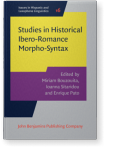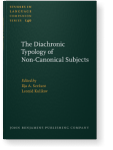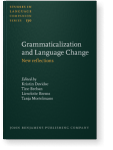Marcela Flores
List of John Benjamins publications for which Marcela Flores plays a role.
2018 Chapter 6. The dative experiencer of Spanish gustar Studies in Historical Ibero-Romance Morpho-Syntax, Bouzouita, Miriam, Ioanna Sitaridou and Enrique Pato (eds.), pp. 123–148 | Chapter
This paper focuses on the dative experiencer of Spanish gustar ‘to please, like’, which replaced an older nominative experiencer. The syntactic shift calls for attention since it goes against the well-established diachronic tendency for oblique arguments to be eliminated in favor of nominative… read more
2013 On the historical expansion of non-canonically marked ‘subjects’ in Spanish The Diachronic Typology of Non-Canonical Subjects, Seržant, Ilja A. and Leonid Kulikov (eds.), pp. 163–184 | Article
In this paper we focus on a non-canonically marking pattern of Spanish which has been related to the cross-linguistic phenomenon of oblique or quirky subjects. In the course of time, contrary to the tendency observed in most European languages, the Spanish dative pattern, which has its roots in… read more
2012 Emergence and grammaticalization of constructions within the se me network of Spanish Grammaticalization and Language Change: New reflections, Davidse, Kristin, Tine Breban, Lieselotte Brems and Tanja Mortelmans (eds.), pp. 249–270 | Article
Historical linguistics has begun to explore the way new insights into change can be gained from a constructional approach to language. In this work we focus on a Spanish construction used for events caused accidentally by a human participant marked dative. The construction enters fairly late in the… read more
2009 On the development of Recipient passives in DO languages: A case study Historical Linguistics 2007: Selected papers from the 18th International Conference on Historical Linguistics, Montreal, 6–11 August 2007, Dufresne, Monique, Fernande Dupuis and Etleva Vocaj (eds.), pp. 123–134 | Article
Passives of ditransitive verbs vary as to whether they promote the Theme argument or the Recipient. In general terms, Theme passives associate with Direct Object (DO) languages, whereas Recipient passives are characteristic of Primary Object (PO) languages. In this work, we ask what motivates some… read more



